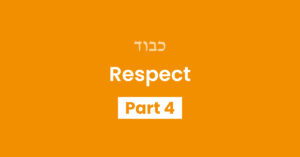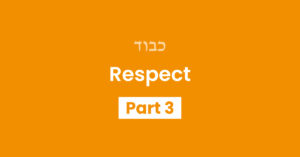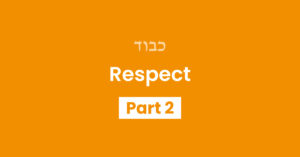We are now in the weeks of Sefiras HaOmer, when we do not get haircuts or listen to music. Why not? The Talmud1 explains: We are mourning to remember the 24,000 students of Rabbi Akiva who died nearly 2,000 years ago.
Why did they deserve to die? The Gemara explains: “Lo Nahagu Kavod Zeh Lazeh: They did not treat each other with respect.”
“Lo Nahagu Kavod Zeh Lazeh: They did not treat each other with respect.”
Even though these tragic deaths happened almost 2,000 years ago, if Chazal still require us to mourn today, then it must be that the message is still very relevant to us today. This month, let’s try to understand what it means to “give Kavod (respect/honor)” to another person, and learn some different ways to treat our friends with the proper respect.
What Kavod Means – You Matter
What does “kavod” really mean? Kavod (כבוד) comes from the same root as “kaveid” (כבד) which means “heavy.” When I “give kavod” to another person, it means that I attribute “weight” – or importance – to them in my mind. I treat them in a way that demonstrates that they are important. This person ”carries weight” and significance. This person matters.2
This person matters.
Take a moment now and think of some people in your life who matter. Perhaps your spouse, your parents, your Rebbe, or your best friend. How do you show them that they matter? For your parents, you might stand up when they enter the room. For a Rebbe, you give him your full attention and make sure not to interrupt when he speaks. For your best friend, you listen when they talk, and treat them with sensitivity. This is what it means to treat another person with “kavod.” It means treating them in a way that shows that they matter.
It means treating them in a way that shows that they matter.
By contrast, there are things in our lives which we feel don’t really matter. When I cut something out of a piece of paper and there are scraps left over, I throw them out because they don’t matter – they’re not important to me. When I walk outside, I walk freely without worrying about stepping on ants, because the ants don’t have much significance for me.
Whether or not we should be stepping on ants – or any of Hashem’s creations – is not the point here. Rather, the point is that when I feel that something – or someone – matters, then I treat them with the respect they deserve.
Who Deserves Kavod?
If everyone who “matters” deserves to be treated with Kavod, then who really matters? Which of our friends and acquaintances must be treated with respect?
The answer is every Jewish person must be treated with respect, because every single Jew matters to Hashem, and matters to the entire world.
Every single Jew matters to Hashem, and matters to the entire world.
Chazal make this point very clearly in the Mishna3: “Why did Hashem create only 1 single person, Adam, at the beginning of Creation? To teach us that anyone who destroys even one Jewish soul is as if he destroyed and entire world, and anyone who gives life to even one Jewish soul is as if he sustained the entire world.”
Why does every person matter so much?
The Nefesh HaChaim4 explains: Every person was created “B’Tzelem Elokim – in the image of G-d.”5 What does this mean? Well, the word “Elokim” means “power.” When used in reference to Hashem, it means that Hashem is All-Powerful.
When the Torah says that man was created “B’Tzelem Elokim,” it means that just as Hashem has the power to change things in the world, every human being was given the power to affect the entire world. Every time we perform a mitzvah, it brings goodness, light, and holiness into this world. And every time we sin, it can bring pain and destruction into this world, chas veshalom. The fact that man was created “in the image of G-d” means that man has the power to affect the entire world through his actions and thoughts.
Every human being was given the power to affect the entire world.
Similarly, the Rambam6 states: “Every person must view himself as if the entire world is hanging in the balance. One mitzvah can tip the entire world to the side of merit. And one sin can tip the entire world to the side of guilt and destruction.”
When we recognize that every Jew wields this tremendous power to affect the entire world, then we realize that every single Jew matters tremendously. The elderly woman I see in the supermarket, the little boy walking down the street, and my neighbor who goes to a different shul – they might not seem so relevant to my personal life, but when I see them, I can remember that they matter tremendously to Hashem.
Six-year-old Shlomo’s bracha might bring down an abundance of goodness to the world; the elderly woman’s tefillah might save the entire town from a tragic fire. My neighbor’s act of kindness might start a whole chain of kindnesses that brings happiness to many people. Every person’s thoughts, feelings, and actions have a tremendous impact on the spiritual and physical state of the entire universe.
This week, let’s practice focusing on the “Tzelem Elokim” in every person – recognizing that every Jew has the power to affect the entire world with a single mitzvah or aveira that they do. When I recognize that every single person matters, then I will naturally feel more likely to treat them with the respect they deserve.
Sources: [1] Yevamos 62b; [2] Kavod Part 2: The Health of Recognition by Rabbi Chaim Dov Stark; [3] Sanhedrin 4:5; [4] Shaar 1: Perek 2-3; [5] Bereishis 1:27; [6] Rambam Hilchos Teshuva 3:4
Your Challenge
Once a day, do something that shows you are treating another person with respect, while thinking to yourself: “This person matters!”
FOR EXAMPLE:
- Smile at another person
- Give someone your full attention, with eye contact, when they are speaking to you
- Make an effort to speak in a kind and gentle manner
- Give someone a compliment
- Refrain from saying something negative about another person
- Refrain from saying something that might make someone else uncomfortable (even if it’s “just a joke”)
Torah Questions
- The pesukim in Vayikra 19:11-18 mention many ways that we should avoid hurting other people. Name at least two.
- According to Metzudas Tziyon, what does “Kevodi” (my honor) refer to in Tehillim 57:9?
- According to Pirkei Avos 4:1, who is honorable?
- It says in Pirkei Avos 4:3: “Do not scorn any person, and do not disgrace any thing, because ________”?
- Fill in the blank: Rabbi Eliezer said: “You should value the honor of your students as much as you value your own honor, and you should value the honor of your friend as much as you ______.” (Pirkei Avos 4:12)
- What does the Gemara call someone who is good to Hashem and also good to people? (Kiddushin 40a)
- What does the Gemara call someone who is good to Hashem but treats people badly? (Kiddushin 40a)
Questions to Ponder
- It says in Pirkei Avos that your friend’s honor should be as precious to you as your own honor. Is this really possible? Is it possible to care about your friend’s honor just as much as you care about your own? If so, what can we do to help ourselves achieve such a level?
- Rav Yerucham Levovitz writes that disgracing one’s friend is, in some way, more serious than murder. How could that be?
- The Talmud Yerushalmi says that when someone greets his friend, it’s as if he is receiving (“greeting”) the Divine Presence of Hashem. How could that be? What do you think this means?





